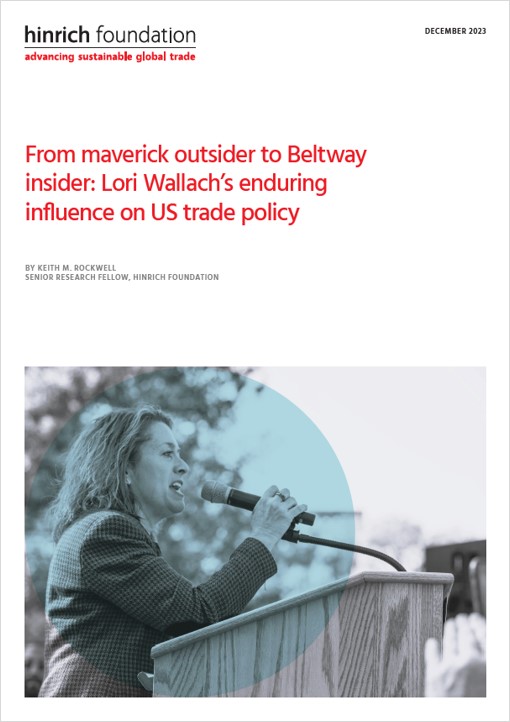Published 12 December 2023
Once considered a firebrand maverick, American activist Lori Wallach has become a card-carrying member of the establishment whose hand is seen in the intellectual underpinnings and implementation of the most sweeping changes in US trade policy since WWII. Keith Rockwell interviews Wallach in this exclusive profile.
At the outset of her career more than 25 years ago, the mainstream trade policy establishment considered Lori Wallach an outsider, a radical, and a militant propagandist.
These days, Wallach dominates policy thinking to such an extent that trade experts across the political spectrum acknowledge her influence and see her hand in the intellectual underpinnings and implementation of the most sweeping changes in US trade policy since World War II.
Long-held US trade policy positions have been jettisoned and replaced with policies that closely mirror those promoted by the 57-year-old activist. Once considered a firebrand maverick, Wallach has quietly become a card-carrying member of the establishment who is close to US Trade Representative Katherine Tai as well as other senior officials in the White House, Federal Trade Commission, and Labor Department. Tai fondly recalls anecdotes about Wallach, including how Wallach sent chicken soup to Tai and her Democratic colleagues, when Tai was Democratic trade counsel for the House Ways and Manes Committee in 2019.
The fondness is reciprocated. Wallach refers to Tai as “the unicorn USTR for this moment.” She praises Tai for being “the unusual person who knows about the WTO and free trade agreements and anti-dumping law, and, and, and … she led the renegotiation of NAFTA under Trump, which had the biggest majority support in the history of trade agreements.” She adds that Tai is “incredibly strong and formidable.”
Wallach’s influence now transcends partisan politics. Though a Democrat, Wallach also had the ear of another trade skeptic, Robert Lighthizer, who served as USTR in Trump’s Republican administration.
Yet, one criticism of Wallach which has dogged her from the start, and seems no less relevant today, is that for all her success in upending policies or negotiations she does not favor, she doesn’t have much of a track record in building policy that advances trade while protecting the communities she seeks to defend. We know what she doesn’t want, but we are less certain about what she wants.
Wallach now counts a long list of trade advancements she has helped to stop in their tracks: the Trans-Pacific Partnership, global rules for digital trade, and political support for intellectual property protection, among others. Deliberately or not, Wallach has shaped a more inward-looking, nationalistic America, one in which commercial engagement with the outside world has been replaced with largely unsuccessful calls for its trading partners to tie their commerce policy to non-trade standards set by the United States.
Ironically, the multilateral architecture which Wallach helped to undermine had provided her with a platform to project her global profile. While her power inside Washington has grown, it seems increasingly hard to imagine how she might cast this power beyond the Beltway as multilateralism crumbles. The risk for her, as with many Beltway insiders, is that she becomes just another powerful courtier in the endless theater of Washington’s political kabuki.
For all the lessons that Wallach learned and has taught over three decades at the heart of US trade policy, she appears to have missed a key one: All negotiations, if they are to result in agreement, require compromise.
Download Keith Rockwell’s full paper here. The transcript of the interview is here.
© The Hinrich Foundation. See our website Terms and conditions for our copyright and reprint policy. All statements of fact and the views, conclusions and recommendations expressed in this publication are the sole responsibility of the author(s).






